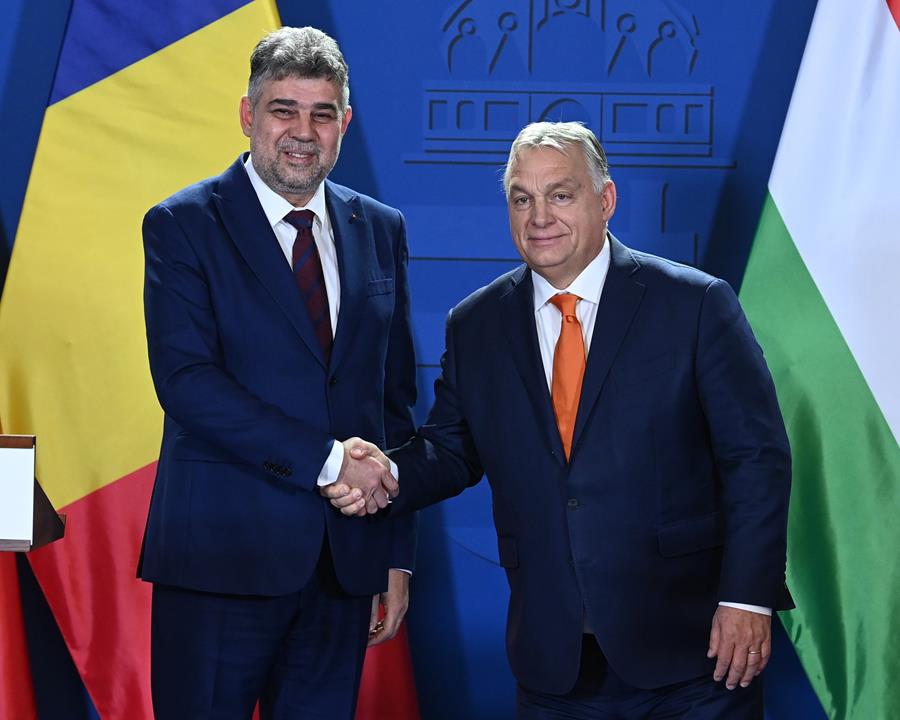Orbán said the government’s earlier pledge of a one million forint average wage had been received by “a choir of the sceptical” but he said it had been no different from the reception of the government’s 2010 announcement of efforts to create one million new jobs.
“They said it was impossible, still, compared to 3.7 million employed at the time now we have 4.7 million people in employment… Hungary can achieve the one million forint average wage,” he said.
The prime minister suggested that companies should strive for efficiency and higher productivity to be able to offer the higher wages. He also added that the government was open to proposals by the chamber of commerce aimed at tax cuts, better vocational training and programmes to increase the efficiency of companies.
Hungarians in Romania must have parliamentary representation, Orbán says
Meanwhile, Orbán said that at the parliamentary elections set for Sunday, Hungarians in Romania will have to “make sure” that they have representation in the national assembly. “Without parliamentary representation it is impossible to promote the interests of the Hungarian community in the whole of the Carpathian Basin,” he added. If ethnic Hungarians had “appropriate weight” in the Romanian parliament they could make the Hungarian government’s job easier, facilitating assistance to them from Hungary.

He said Hunor Kelemen, the head of the Democratic Alliance of Hungarians in Romania (RMDSZ), had “held his own” in the first round of the Romanian presidential election, representing not just ethnic Hungarians but the entire nation.
He said the Romanian presidential election campaign had demonstrated how modern technology connects with voters, adding that the kind of social media platforms used in a campaign and how they influence voters was a “very exciting and undetermined question”.
“Romania is a testing ground for this, and we can draw the various conclusions and determine whether we have any work to do in preventing such problems in Hungary,” he said.
Hungary will get peacetime budget in 2025
On another subject, the prime minister said the “peacetime” budget bill submitted by the government opened the door to a new economic policy.
He said the draft budget being debated in parliament assumes that US President-elect Donald Trump can end the war. This is why, Orbán said, the government could implement a large minimum wage increase, roll out credit for young blue collar workers, launch a scheme for strengthening SMEs and introduce measures to ensure affordable housing and support young people.
Orbán said Hungary was capable of making use of the opportunities presented by peace, adding that “we won’t waste a single moment”.
Struggles with the EU
He added, at the same time, that the government would have to carry out these measures “in opposition to the European Union”.
“We’re locked in simultaneous struggles with the European Union on the issues of economic policy, migration and child protection,” the prime minister said. “The point of the National Consultation survey is to strengthen Hungary’s position in this struggle and to be successful in fighting these battles.”
He said the end of the war would mean peace, peace would mean security and security would bring a “good economy”.
But, he said, the EU was “constantly blocking and attacking Hungary’s economic policy”. He said he fended these off and wanted to “protect Hungary from these decisions in Brussels”, adding that this required a fight, which required strength and support. “We’re in the opposition in Brussels,” he added.
Orbán said the implementation of the migration pact would be “fatal” for Hungary.
He also said the hearing of the lawsuit aimed at scrapping Hungary’s child protection law was under way at the European Court of Justice. He said there was a political party that would allow same-sex couples to adopt in Hungary. “This is completely at odds with the child protection law,” Orbán said, adding that “we have to win the battles against Brussels.”
Read also: